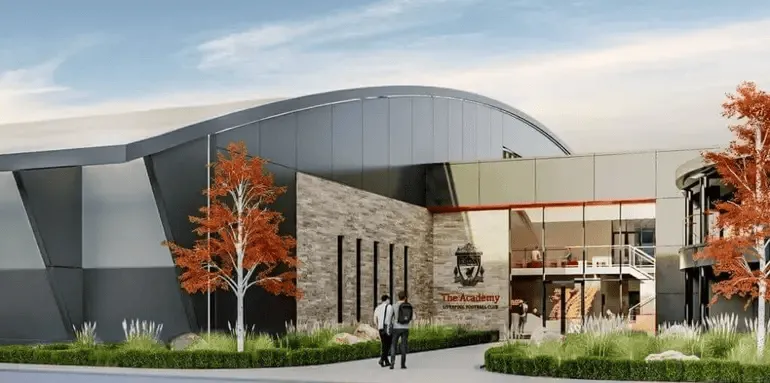
Liverpool is set to spend £20 million on reconstructing its youth academy – the largest-scale renovation of its youth base since it was opened in 1998.
Fenway Sports Group (FSG), the club’s owner, views this as recognition of the academy’s significant contributions to Liverpool’s success in recent years.
An indoor domed stadium will be built on the existing main pitch and connected to the current academy building. The academy, located in Kirkby, nine miles northeast of Liverpool, will undergo extensive renovations.
Once the domed stadium is completed, Liverpool will have a full-size indoor pitch for the first time. Additionally, the medical and sports science facilities will be upgraded.
The outdoor artificial turf will be replaced with natural grass, and the main pitch will become the centerpiece of the training base, equipped with a new stand capable of seating approximately 500 spectators. Planning applications will be submitted this month, and Liverpool hopes the project will be completed by 2028.
Julian Ward, FSG’s Technical Director, visited over 25 clubs across Europe to gather information before formulating the plans. The main construction work is regarded as the second phase, with the first phase having been completed this summer.
Approximately £2 million ($2.7 million) was allocated to improving existing facilities, including the installation of multiple caged pitches for small-sided games, a sports development area named “The Yard”, a Padbol court (a sport combining padel, football, squash, and volleyball), and a skills training area inspired by similar facilities at Roma’s youth academy. Furthermore, the academy has installed new floodlights to enable all youth training pitches to be used in the evening.
“This is a significant move,” Alex Inglethorpe, the long-serving Academy Director, told Camel Live.
“In recent years, the club’s owners have launched a series of infrastructure projects, including the reconstruction of two stands at Anfield, the construction of the AXA Training Centre in Kirkby to bring all our players together in one location, and the renovation of the Melwood Training Ground to allow the women’s team to train there.
As an academy, we have been patient and aware of our place in the training setup, but now it’s our turn – and that’s really exciting. We’ve never had a full-size indoor training facility that can match many of our competitors before. While I fully support keeping the players fit in Kirkby’s wind and rain, there have been many times when we’ve had to cancel training or the quality of training has been affected. This will make a huge difference.”
Earlier this year, Twenty First Group, a sports intelligence consultancy that works with several Premier League clubs, estimated that Trent Alexander-Arnold had saved Liverpool approximately £145 million over nine first-team seasons, based on his contributions and the potential cost of signing and retaining a top-tier right-back during that period.
“I’ve always wanted us to play our part,” said Inglethorpe, who joined Liverpool from Tottenham Hotspur in 2012 as U21 coach before being promoted two years later.
“We’ve also won some honors in the past thanks to the contributions of academy players, but when you win the Premier League title and your academy players have more game time than those at any other club, I don’t think it gets much better than that. I believe no one has achieved that since Sir Alex Ferguson was at Manchester United.
Another important thing for me is that we rank sixth in the Premier League in terms of total youth academy expenditure, so we haven’t achieved these results by spending big. Many academies spend far more than we do.
We’ve always delivered results in a prudent way.
We know that this could be the end of a cycle. You can’t expect to reap significant benefits and then continue to have academy players making the same level of contribution on the pitch. We have to rebuild the youth system.”
Last November, Matt Newberry, who previously served as Head of Academy Recruitment and Loan Director, was promoted to Global Head of Talent. He will continue to ensure Liverpool identifies the best opportunities in the domestic market and will have a broader remit as FSG looks to acquire a second European club.
Chris Dowling, the Head of Academy Recruitment, is another key figure who played a role in signing young players such as Rio Ngumoha and midfielder Trey Nyoni, who joined from Leicester City in 2023.
This month, Liverpool signed young striker Will Wright from Salford City for an initial fee of £200,000 – a deal also driven by local scouts.
This summer, the coaching staff at Liverpool’s academy also saw changes.
Marc Bridge-Wilkinson, the U18 coach, stepped down after a decade in the role to join Huddersfield Town, a Championship club, as assistant manager.
Barry Lewtas left his position as U21 coach after 12 years and was subsequently appointed England U16 head coach and England U20 assistant coach.
Former Wales manager Rob Page surprisingly joined the U21 setup, while Simon Wells arrived from Manchester United’s academy to take charge of the U18s.
Gary Probert, the former Director of Football Operations at Ipswich Town, will start his role as Liverpool’s new Loan Manager later this month. Probert previously served as Academy Director at Bristol City.
A new initiative at Kirkby this season is the synchronization of training times for first-team, U21, and U18 players, with most training sessions starting at 11:45 a.m. This allows for greater flexibility when moving players from one group to another.




